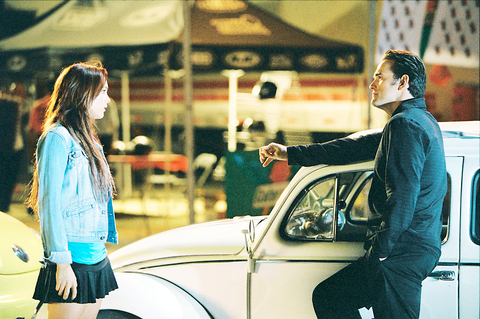"You can take the car out of the junkyard, but you can't take the junkyard out of the car," growls Trip Murphy (Matt Dillon), an arrogant stock-car racing champion whose supremacy has been seriously challenged by a souped-up 1963 Volkswagen Beetle and its plucky driver, Maggie Peyton (Lindsay Lohan). Trip, the designated villain in Herbie: Fully Loaded, eventually comes to believe that the upstart Beetle is demonically possessed. "It's alive!" he screams as men in white coats drag him into the back of an ambulance. But Trip isn't crazy.
Herbie: Fully Loaded, which opens nationwide today, is a perfectly silly movie for a silly season that in recent years has forgotten how to be this silly. Directed by Angela Robinson, this latest installment in the movie-television franchise about a tiny car named Herbie with a will of its own and the temperament of a rambunctious seven-year-old knows exactly what it is and what it isn't.
What it is is The Love Bug for the Nascar generation, with a charismatic teenage star at the wheel. This G-rated movie comfortably blends the cutesy mannerisms and well-scrubbed wholesomeness of that late-60's Disney hit with the vroom of today. Never for a moment, even during the racing sequences, does it pretend to be real.

What Herbie: Fully Loaded isn't is a movie to be taken seriously, unless you consider Lohan's Maggie, who defies her father, Ray Sr (Michael Keaton), to race Herbie, a feminist role model for tweener girls. In the original Love Bug, Herbie salvaged the career of a fading race-car driver, played by Dean Jones, by driving him to victory. In Fully Loaded, Maggie salvages Herbie from a junkyard with US$75 given to her as a college graduation present. Later, she saves him from destruction at a demolition derby, just as the battered little bug is about to be chewed up by a gargantuan truck with metal teeth.
As in so many Disney films, the signals are shrewdly mixed. Though Maggie triumphs in the ultramacho world of Nascar, her victory comes at a price. As the story begins, she arrives at her college graduation by skateboard at the last minute. The first person in a family of stock car racers to finish college, she is looking forward to moving to New York to work as an assistant at ESPN.
As in another Disney film released this year, Ice Princess, the heroine is forced to choose between short-term sports stardom and a long-term career investment that makes use of her education. (In Ice Princess the choice is between the rink and college.) It's not much of surprise that in an era in which everyone is supposedly entitled to his or her 15 minutes of fame, stardom wins.

It helps that Lohan, unlike the pallid Michelle Trachtenberg in Ice Princess, is a genuine star who combines a tomboyish spunk with a sexy, head-turning strut, executed with minimal self-consciousness. Likable but never saccharine, confident but not snooty, and endowed with the natural freckled-faced beauty of an 18-year-old Everywoman, Lohan seems completely at home on the screen.
If she were not its star, Herbie: Fully Loaded would have to rely on stock mechanical gimmickry for its appeal and on the reassuring but recycled image of a little car that can outrun the big guys. Herbie spits oil into the faces of his detractors and bops them with doors that suddenly swing open with alarming force. He bleats his horn in furious protest, flirts with his headlights and, to the sounds of Lionel Richie's Hello, nuzzles up to a sleek yellow sports car, bumper to bumper.
In one contest, he streaks to victory on a guardrail. In another, he makes a sudden leap to the sounds of Van Halen's Jump. If the movie is a big hit, it could signal the waning of the sport utility vehicle era; or not.
After some tension and misunderstanding, Lohan and Herbie eventually form a bond of trust. Once upon a time, it used to be a girl and her horse. Now it's a girl and the car that drives her.

Aug. 25 to Aug. 31 Although Mr. Lin (林) had been married to his Japanese wife for a decade, their union was never legally recognized — and even their daughter was officially deemed illegitimate. During the first half of Japanese rule in Taiwan, only marriages between Japanese men and Taiwanese women were valid, unless the Taiwanese husband formally joined a Japanese household. In 1920, Lin took his frustrations directly to the Ministry of Home Affairs: “Since Japan took possession of Taiwan, we have obeyed the government’s directives and committed ourselves to breaking old Qing-era customs. Yet ... our marriages remain unrecognized,

During the Metal Ages, prior to the arrival of the Dutch and Chinese, a great shift took place in indigenous material culture. Glass and agate beads, introduced after 400BC, completely replaced Taiwanese nephrite (jade) as the ornamental materials of choice, anthropologist Liu Jiun-Yu (劉俊昱) of the University of Washington wrote in a 2023 article. He added of the island’s modern indigenous peoples: “They are the descendants of prehistoric Formosans but have no nephrite-using cultures.” Moderns squint at that dynamic era of trade and cultural change through the mutually supporting lenses of later settler-colonialism and imperial power, which treated the indigenous as

An attempt to promote friendship between Japan and countries in Africa has transformed into a xenophobic row about migration after inaccurate media reports suggested the scheme would lead to a “flood of immigrants.” The controversy erupted after the Japan International Cooperation Agency, or JICA, said this month it had designated four Japanese cities as “Africa hometowns” for partner countries in Africa: Mozambique, Nigeria, Ghana and Tanzania. The program, announced at the end of an international conference on African development in Yokohama, will involve personnel exchanges and events to foster closer ties between the four regional Japanese cities — Imabari, Kisarazu, Sanjo and

By 1971, heroin and opium use among US troops fighting in Vietnam had reached epidemic proportions, with 42 percent of American servicemen saying they’d tried opioids at least once and around 20 percent claiming some level of addiction, according to the US Department of Defense. Though heroin use by US troops has been little discussed in the context of Taiwan, these and other drugs — produced in part by rogue Chinese Nationalist Party (KMT) armies then in Thailand and Myanmar — also spread to US military bases on the island, where soldiers were often stoned or high. American military policeman